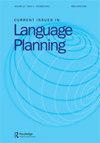Negotiating hegemonies in language policy: ideological synergies in media recontextualizations of audit culture
IF 1.8
1区 文学
Q2 EDUCATION & EDUCATIONAL RESEARCH
引用次数: 5
Abstract
ABSTRACT One of the products of globalization in sociolinguistics is the emergence of transnational regimes in language policy, in which power is exercised across boundaries of traditional nation states. This paper engages with audit culture, a transnational policy mechanism which involves the continuous evaluation of nation states’ performance through the use of purportedly neutral, typically quantitative instruments. As achieving broader visibility in public discourse is a key part of how such evaluations enforce language policy regimes, the paper presents an analysis of how an audit instrument, the Education First English Proficiency Index, was recontextualized in media discourse in Thailand over a 6-year period. The findings highlight an apparent discontinuity, as much of the neoliberal rhetoric in the audit instrument was not taken up in Thai media. Rather, the recontextualization was selective, with elements of the audit texts being integrated into an already established language policy regime in Thailand, built on nationalism and developmentalism. These findings point to the need to consider how language policy mechanisms like audit culture can facilitate synergies between hegemonic ideologies, particularly when they are recontextualized across different scales.语言政策中的谈判霸权:审计文化媒介再语境化中的意识形态协同作用
社会语言学全球化的产物之一是语言政策的跨国制度的出现,在这种制度下,权力的行使跨越了传统民族国家的边界。本文涉及审计文化,这是一种跨国政策机制,通过使用据称中立的、典型的定量工具,对民族国家的绩效进行持续评估。由于在公共话语中获得更广泛的知名度是此类评估如何执行语言政策制度的关键部分,因此,本文分析了在泰国6年的时间里,教育第一英语水平指数(Education First English Proficiency Index)这一审计工具是如何在媒体话语中重新定位的。调查结果突出了一种明显的不连续性,因为泰国媒体没有采用审计工具中的许多新自由主义言论。相反,重新纳入背景是有选择性的,审计案文的内容被纳入泰国已经建立的以民族主义和发展主义为基础的语言政策制度。这些发现表明,有必要考虑审计文化等语言政策机制如何促进霸权意识形态之间的协同作用,特别是当它们在不同尺度上被重新语境化时。
本文章由计算机程序翻译,如有差异,请以英文原文为准。
求助全文
约1分钟内获得全文
求助全文
来源期刊

Current Issues in Language Planning
Multiple-
CiteScore
4.80
自引率
16.70%
发文量
26
期刊介绍:
The journal Current Issues in Language Planning provides major summative and thematic review studies spanning and focusing the disparate language policy and language planning literature related to: 1) polities and language planning and 2) issues in language planning. The journal publishes four issues per year, two on each subject area. The polity issues describe language policy and planning in various countries/regions/areas around the world, while the issues numbers are thematically based. The Current Issues in Language Planning does not normally accept individual studies falling outside this polity and thematic approach. Polity studies and thematic issues" papers in this journal may be self-nominated or invited contributions from acknowledged experts in the field.
 求助内容:
求助内容: 应助结果提醒方式:
应助结果提醒方式:


